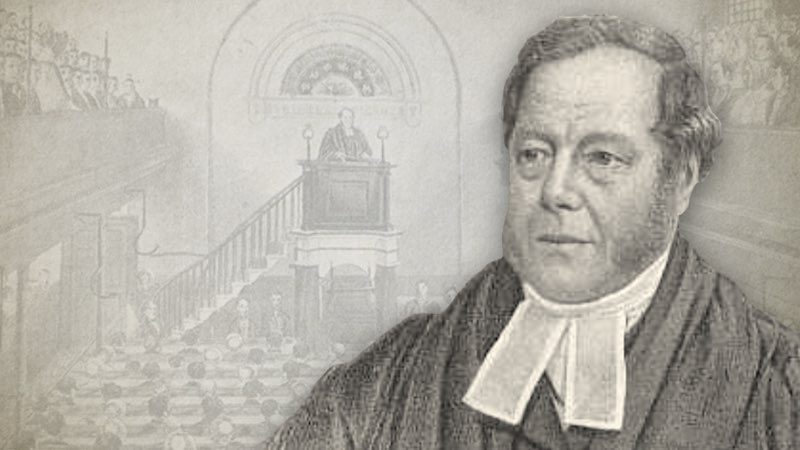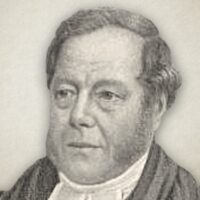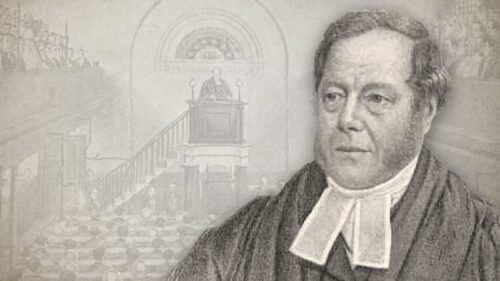
Letter 8: To Abiah—On Adoption
My dear Abiah,
When the objects of Jehovah’s electing love receive the adoption of sons, and are introduced to the family of God, it is impossible to describe the blessedness of their experience, or to delineate the extent of their privileges. I trust you have shared in that mercy; and I am solicitous that you should be conscious of its value and importance; let me therefore entreat you to read this epistle with fervent prayer, that the brief outline it contains of this most valuable privilege may be clearly understood and rendered very useful to your soul.
The adoption of a sinner into the family of God is an act of his own sovereign love pursuant to the election of grace, in which Jehovah regards the sinner as a beloved child, and having enrolled his name as a part of his family, exercises paternal kindness toward him and introduces him to all the privileges of the sons God; so that he who was “by nature a child of wrath even as others,” is by adopting grace, a child of God through Jesus Christ.
This unspeakable mercy flows from “the good pleasure of his will,” who exercises absolute sovereignty over all worlds; hence we find sinners of every age, nation and character, made the subjects of this grace, who could have nothing to recommend them but guilt and rebellion nor should any sinner despair of sharing in the blessedness of this holy family, who is made willing to conform to its discipline, and accept its privileges; may even this willingness is an evidence of adoption; and God has promised that he will be a Father to such, and that they shall be his sons and daughters. 2 Cor. 6:18.
From such a Father much may be expected, and to such a Father much is due; it is therefore very important to receive and cherish the spirit of adoption, that our intercourse with God, and our conduct toward him, may be consistent with our high character as his children. This endearing relation should be kept in view under all circumstances, it would then produce the happiest effect in the experience. Can you, my dear Abiah, approach the Most High as your Father? Then with what sweet familiarity do you tell him the secrets of your heart— with what sacred confidence do you ask him to fulfil his promises— and with what holy affection do you cling to his perfections.
In times of danger when attacked by foes, with the simplicity of a child you run eagerly to your Father, and give vent to your sorrow feeling assured of his protection, while he with paternal affection, says “I will contend with them that contend with thee,” adding, a godlike “fear thou not, for I am with thee, be not dismayed for I am thy God; I will strengthen thee; yea, I will help thee; yea, I will uphold thee with the right hand of my righteousness,” Isaiah 41:10. So that your safety does not depend on your courage or prudence, but on your Father’s kindness and power, whose love to you as his child, engages all his perfections on your behalf.
Moreover the spirit of adoption dictates unreserved dependence on the Father for the supply of every want: whence then arise all those distressing anxieties which intrude upon your most sacred hours, and mar your choicest enjoyments? Is your Father’s wealth all expended? Is your Father’s affection abated or lost? Has he ever said you nay, in any of your spiritual applications? Has he not said, “ask, and ye shall receive?” Nay has he not added, I will withhold no good thing from you? Go then, my dear Abiah, and ask your Father for all you need, remembering that “every good gift, and every perfect gift is from above, and cometh down from the Father of lights, with whom is no variableness, neither shadow of turning.”
It is the province of your Father to feed— clothe— instruct— and correct you, all which you may expect at his hands: for although the family is immensely large, every child is amply provided for, and no one neglected or overlooked: the Father delights in his children, and Jesus is not ashamed to call them brethren; an eternal inheritance is provided for them, and the Holy Spirit stands engaged to qualify them for the enjoyment of it and bring them to it.
As children, they are “heirs of God through Jesus Christ,” “fellow heirs of the grace of life;” yea “joint heirs with Christ,” to all that the covenant love of the Father has provided; but while in a state of minority, their Father has promised to give them daily bread, which they are to receive daily at his hand, waiting till they come of age to be put in possession of their everlasting inheritance.
Adoption is a blessing extending from everlasting to everlasting, a decree which cannot be revoked; many of the children of God are indeed very perverse and ungrateful, but all this their Father knew before he adopted them; hence he chastens those whom he loves, and scourges every son whom he receives, but never abandons them. Satan shall never have to say of a sinner in torment, this is a wretch turned out of the family of God! no, the Father will not cut off an heir of glory from his inheritance, nor suffer his most rebellious children to ruin themselves. John 10:28,29.
This security arises from the nature and antiquity of adoption, as an act of the divine mind, which is distinct from the reception of the spirit of adoption into the sinner’s heart. The whole family of God were adopted in Christ, when he was chosen as their covenant head, and then God the Father considered them his own children, registered their names on high as such, and prepared a kingdom for them before the foundation of the world.
Hence their reception of the spirit of adoption is said to be owing to this eternal relation, “because ye are sons, God hath sent forth the spirit of his Son into your hearts,” Galatians 4:6.
The spirit of adoption is the witness, not the cause of our being the children of God, and surely my dear Abiah, you will derive unspeakable comfort from this view of the subject, if you feel but one spark of filial affection to God glowing in your soul; and connect with it the sweet thought that it is your Father’s love shed abroad in your heart by the Holy Ghost, you will then come to the delightful conclusion, that the Father has from all eternity adopted you into his family, and has in the fulness of time, made it known to you by causing you to receive the adoption of sons.
If further evidence were necessary for your decision, respecting your interest in this high privilege, I might remind you of the family likeness, which is genuine spirituality— the family distinction, which is separated from the world— and the family diet, which is bread of life sent down from heaven, may I not appeal to your heart that you do sigh for an increase of spirituality— that you do not feel happy in any company except that of the saints— and that nothing can satisfy the cravings of your soul but living upon Jesus? Be assured my beloved friend, that these sensations exist no where but in the heart of a child of God, yet many in whom they are found cannot claim their sonship, through the power of unbelief; nor can any thing but the mighty operation of the Holy Spirit, remove the spirit of bondage, and teach the soul to cry Abba, Father. I never knew a child capable of saying “ father” as soon as born, nevertheless it is almost the first thing a child is taught to say; this is the plan of the Lord’s teaching, “when ye pray say, OUR FATHER,” and when the spirit of adoption is fully received, the child of God looks up to Jehovah and exclaims, “doubtless thou art my Father,”— he looks into the table and regards it as his Father’s letter— he hears the gospel preached and receives it as a message from his Father— he goes into his closet to tell his Father his wants, and gain access to his Father’s heart— and looking forward to heaven, he exclaims “it is my Father’s habitation, and shall be my eternal home.”
How safely my dear Abiah, may you leave every difficulty in your Father’s hand, both in providence and grace, without perplexing your mind with the events of futurity; unless like some unruly self-willed children, you think you know better, and can do better than your Father, which is conduct so presumptuous and ungrateful, that I am willing to hope you tremble at the mention of it.
Before I close this short sketch of adopting grace, I must take the liberty of pressing upon your attention, the high dignity which it confers and the infinite obligations under which it lays you. Forget not that you are the King’s son— that the whole redeemed family in heaven and earth are your kindred— and that the whole revenue of grace and glory are your portion. Never submit to the contemptible littleness of party spirit; but with noble affection, call every man your brother whom God owns as his child. Never stoop to the maxims or trim to the spirit of the world; it is another family, yea an opposite family, and the less intimacy you have with it the better your Father will be pleased, and the more extensive will be your spiritual prosperity.
Your Father’s honor— your Father’s interest— and your Father’s will, should engage your constant attention, employ all your energies and regulate all your conduct; and in proportion as the spirit of adoption influences your heart, these things will constitute the conspicuous traits of your life; for I know of no incentive to the performance of duties so powerful as my Father’s love, my Father’s promise, and my Father’s presence.
“Beloved; now are we the sons of God, and it doth not yet appear what we shall be;” but, the spirit of adoption teaches us to expect, all that our Father’s love can dictate, and all that our Father’s hand can bestow for our present good and eternal happiness.
That you my dear Abiah, may be enabled to cultivate much intimacy with our heavenly Father, in the name and person of our divine elder Brother, by the teaching of our holy Preceptor.
Is the prayer of
Your affectionate brother,
J. I.
Oh, wond’rous love! the great Jehovah deigns
To call a worm his child !— look up my soul,
And claim this sweet relation to the Lord:
MY FATHER! how it moves heart to love!
And shall I come before him like a slave?
Or rude and thoughtless to his presence rush?
Forbid it Lord! Let holy confidence,
Unfeigned love, a fix’d assurance and a solid peace
Unite with solemn awe and filial fear,
In all my secret intercourse with thee.
Whence rise my fears? why is my soul cast down?
The foes— the fiends— the sins I often dread,
MY FATHER holds in chains, and will control:
I have his grace— I shall have glory too,
Because he is MY FATHER, and MY GOD!!!
Joseph Irons (1785-1852) was an Independent sovereign grace preacher, author and hymn writer. In 1819, he was appointed the minister of Grove Chapel, Camberwell, a position he held until his death thirty-three years later. John Hazelton wrote of him:
“Joseph Irons (1785-1852) was one of the ablest preachers of his day, and a powerful and prolific writer. His doctrinal teaching was pellucidly clear and consistent; he was a profound student and sound expositor of the Word of God, and many were influenced by his sermons, spoken and printed, and confirmed in the faith of God's elect. He was a determined foe of Romanism and Ritualism, deeply interested in the welfare of the young, and ready to aid any effort that commended itself to him on the basis of the faith for which he so earnestly contended. Many of his hymns have secured a permanent place in our hymnology, and his sermons are doctrinal, experimental, and practical in the best sense of the words. He never ceased to preach Christ, making Him the Alpha and Omega of all his discourses. He was born at Ware, in Hertfordshire, and brought up under the care and counsel of a godly father, who was a builder, and who trained his son in that trade. When he left his father's roof, he tells us the parting words were, "There's poor Joseph going to that wicked London. My heart bleeds while I bid him goodbye. I fear it will end in his ruin. You will be far away from a father's eye and a father's counsel, but never will I cease to pray for you that God may preserve and prosper you, although surrounded with so much that is evil." The youth was but eighteen when, in 1803, God led him to the Church of St. Mary Somerset, Thames Street, to hear W. Alphonsus Gunn, and there the arrow was directed into his conscience and he was brought to a saving knowledge of Divine truth. In 1808 his first sermon was preached over a smith's shop at Dulwich; he was actively engaged in business, but on most Sundays would walk from ten to twenty miles, preaching in various villages. "My only companions were my pocket Bible and its Divine Author, who often favoured me with the spirit of prayer on the way and shed many a ray of Divine light on the inspired page, so that I was furnished with a 'Thus saith the Lord.'"
After six years' service in Hertfordshire, he became pastor of the Church at Sawston, near Cambridge, and in January, 1818, he preached his first sermon in Camberwell. Ultimately, Grove Chapel was erected and opened on July 20th, 1819, and within its walls until the time of his death he continued proclaiming the Gospel; his mortal remains rest in a vault under the pulpit. In his last sermon, about ten days before his decease, he spoke of heaven in joyful terms: "I confess that my soul longs for it, and I anticipate meeting with prophets and apostles and patriarchs, and above all, with Jesus Himself, to behold Him face to face in glory, to be like Him, and to see Him as He is."
His published writings were numerous, some running into many editions. "Jazer," letters on Gospel doctrine; "Nathaniel," letters on Christian experience; "Nymphas," an exposition of the Song of Solomon; 611 original hymns; and a paraphrase of the Book of Psalms, are among the number. He established a Home Mission and other Societies for visiting and assisting the sick poor, and to the end of his life he was one of the best friends and helpers of the Aged Pilgrims' Friend Society. This great man was no idler in the Lord's vineyard. He talked not about "working for Christ," but delighted to magnify his glorious Lord. His sermons should be models for our preachers to-day in their perspicuity, plainness and power. He could not cut and trim to the times. His faithfulness gave offence to many whose creed and conduct could not bear the blaze of truth and the pointed appeals he made to conscience. Many hard speeches were made against him, but he remained unmoved as an iron pillar. As a man he had very tender feeling and often smarted under the unkind treatment of those of whom better things might have been hoped; but neither the fawning of one party nor the frowns of the other could shake his firmness. When at home in his "Shepherd's Tent," Grove Lane, he used very frequently to visit his chapel; to him it was a peaceful, private promenade, after the close confinement of his study, in which he spent many hours every day. Covenant love, covenant blood and covenant grace were his constant theme. His dying desire, so graciously fulfilled, was that Grove Chapel "might never be desecrated with another gospel." Someone told him that he put too much in his sermons and should reserve ideas for future use. He replied, "Thank God I obtain my materials from heaven; my Master knows what things I have need of, and having called me, He will not allow me to work alone. I get my sermons on my knees with the Word of God before my eyes and if I empty my seed-basket to-day, I know He will fill it to-morrow; therefore I will, God helping me, tell it all out, or it would be like a fire in my bones, burning its way out." Grove Chapel recalls many memories of those who have gone before; in its schoolroom is a unique collection of portraits of free grace ministers of various sections of the one Church. In No. 5 pew in the Chapel is the spot where the Lord first met with the "Wayside Notes" writer, broke him down in contrition of heart and revealed Christ to him as all his salvation, and there are friends still with us who can testify to the power of Mr. Irons' ministry, when in their early years they sat under it.”




